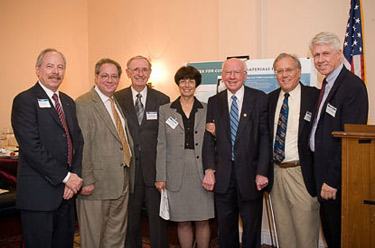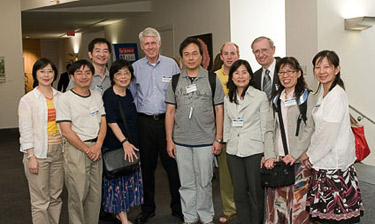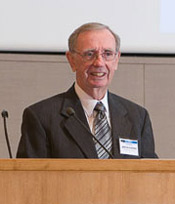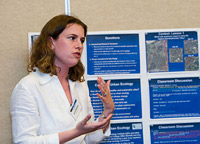
An electronic newsletter for the science education community
Collaborating for Better Science Learning
AAAS hosts fifth annual conference on science curriculum materials
When AAAS Project 2061 and its university partners launched the Center for Curriculum Materials in Science (CCMS) five years ago, the need to improve K–12 science textbooks was clear. Project 2061's evaluations of widely used textbooks had shown that materials presented isolated bits of information and did not help teachers convey the connections among key science ideas to their students. What was not clear at the outset of CCMS was how much progress could be made by pooling the partners' collective resources.
Now, after years of building a research community dedicated to improving science curriculum materials, more than 100 researchers and educators met in July at AAAS headquarters in Washington, DC, for the Center's fifth and final Knowledge Sharing Institute (KSI). Funded by the National Science Foundation (NSF) as a Center for Learning and Teaching, CCMS brings together AAAS, Michigan State University, Northwestern University, and the University of Michigan in its mission to develop new knowledge and leadership that can contribute to the effective design, selection, and use of curriculum materials.
This year's KSI gave participants the chance to share their latest research, to reflect on the progress made over the past five years, and to reaffirm the benefits of collaborating across institutions and individual research studies. The four-day gathering also showcased the emerging science education leaders supported by the Center’s doctoral and postdoctoral programs. A Capitol Hill briefing featured remarks by U.S. Rep. Vernon J. Ehlers (R-Mich.), co-chair of the House STEM Education Caucus, and a poster session in which CCMS scholars discussed their research with policymakers (see AAAS News coverage of this event).

-
Alan Leshner, Brian Reiser, Jim Gallagher, Jo Ellen Roseman, Rep. Vernon J. Ehlers (R-Mich.), Joe Krajcik, and George DeBoer at the CCMS Capitol Hill reception
Photos courtesy of Pepe Gomez
“We are very proud of the contributions that our graduate students and postdoctoral fellows have made to the Center's work,” said Jo Ellen Roseman, director of Project 2061 and CCMS. “Not only have they carried out high-quality research and produced interesting findings, but they will also continue to do so as they move on to faculty and other positions. The graduate students that were trained during the post-Sputnik era went on to become the science education leaders for the next three decades. Given the focused effort today on curriculum research and development, we fully expect our graduates to have similarly productive careers with similar contributions.”
In addition to CCMS researchers from the partner institutions, the conference drew K–12 teachers and administrators, curriculum developers, CCMS alumni now teaching in universities across the country, and Early Career Research Associates affiliated with the Center. A delegation of educators from Taiwan highlighted the international network of researchers committed to improving science teaching and learning.

-
Science educators from Taiwan participated in the conference
As in previous Knowledge Sharing Institutes, the conference provided participants with abundant opportunities to learn from their colleagues and to build collaborations. Seven plenary sessions highlighted the following major areas of the Center's research and mission: Leadership Development, Curriculum Design, Teachers and Curriculum, Assessment, Student Practices, Learning Progressions, and Policy. Each plenary was followed by small group discussions, symposia, interactive poster sessions, and paper sessions that enabled participants to pursue an area in greater depth. In all, some 25 sessions and dozens of posters showcased the Center's work.
In synthesizing five years of collective effort, the KSI paid particular attention to the Center's goals of developing new leaders and advancing research in the field. The following reports on the Leadership Development Plenary and the Assessment Plenary emphasize the progress made over the past five years toward these goals.
Leadership Development: Lessons Learned
When the NSF launched its Centers for Learning and Teaching program, a primary goal was to build a new and more diversified cadre of leaders in science, mathematics, and technology education. As members of the CCMS community came together for their final KSI, the opening plenary session provided an opportunity to take stock of the Center's efforts to fulfill that goal. Organizing the session was Dan Heck, senior research associate at Horizon Research, Inc., which serves as independent evaluator of CCMS. Drawing on data collected from observations of and interviews with CCMS faculty, graduate students, postdoctoral fellows, and research associates, Heck presented a rich and detailed picture of the scholars who have been supported by CCMS and of the opportunities the Center has provided them.
Exceeding the goals established by NSF, the Center has supported 32 doctoral students, 8 of whom have earned PhDs; 15 post-doctoral fellows, 9 of whom have completed their appointments; and 15 early career faculty and researchers, including 10 from institutions outside the Center. CCMS scholars have moved on to faculty and other leadership positions at major universities, informal science institutions, and curriculum development projects, and several were on hand to talk about the impact of the Center on their work and their careers.
In addition to its legacy of new leaders, “CCMS has important lessons to share that can guide similar leadership development efforts in the future,” said Heck. For example, the Center found that successful leadership development involves providing access to a wide range of intellectual perspectives, resources, and tools; to multiple contexts for research; and to opportunities to take part in a range of science education practices (e.g., teaching, teacher education, and curriculum materials development). CCMS has also shown that new leaders in science education can emerge from diverse backgrounds including science disciplines, K–12 education, informal education, cognitive sciences, and technology fields.
According to CCMS co-principal investigator and Northwestern University professor Brian Reiser, the Center's success in developing new leaders is due in large part to its success in building an intellectual community in which people coming from different perspectives are committed to learning from and collaborating with each other. By grounding its research in "problems of real-world practices," Reiser said, CCMS has provided contexts for leadership development that encourage "dialogue and collaboration, not just among individuals but also among the partner institutions."

-
Jim Gallagher, CCMS co-principal investigator and professor emeritus at Michigan State University
The opening plenary session also featured a report on a study of leadership development in science and mathematics education from Jim Gallagher, CCMS co-principal investigator and professor emeritus at Michigan State University (MSU). Designed to identify the characteristics of current leaders in the field, the kinds of experiences that led them to their leadership positions, and the ways in which they influence science and mathematics education, the MSU study also takes a look at the prospects for a new generation of leadership. To gauge changes in the field, for example, the study looked at membership in the National Association for Research in Science Teaching since 1987 and noted an increase in female membership from 28.4% in 1987 to 54.6% in 2006.
Through interviews with current leaders, it became clear that “personal characteristics such as tenacity, enthusiasm, and openness to new ideas can be just as critical to leadership as technical skills,” Gallagher reported. While the personal and professional rewards of leadership are real, current leaders pointed to the costs as well—the lack of tenure and fluctuations in funding for their work were substantial concerns for many. Not surprisingly, recruiting and retaining new leaders were identified as significant, but not insurmountable, challenges for the field.
In final remarks for the session, NSF program officer Janice Earle said that the lessons from CCMS will help to inform the NSF as it tries to identify effective strategies for increasing the nation's capacity to conduct and apply research in science, technology, engineering, and mathematics education. To that end, NSF has also commissioned a three-year longitudinal study of the graduates of CCMS and of the other Centers for Learning and Teaching.
Assessment: Beyond "Kitchen Table" Tests
One research area that saw significant progress in the five years of CCMS work was assessment. Project 2061's deputy director George DeBoer chaired the Assessment Plenary and noted that the Center's assessment work has grown in both the number of people involved and the range of research projects underway that involve the development and use of assessment. The work presented at this plenary session also made clear that progress in educational research on curriculum and instruction is dependent on the availability of high-quality assessment items.
DeBoer discussed the current state of Project 2061's effort to develop assessment items that measure middle school students' understanding of ideas in Benchmarks for Science Literacy and the National Science Education Standards, focusing especially on findings from pilot and field testing. In addition to describing Project 2061's two-year development cycle from initial research to items ready to post online, DeBoer previewed their work to validate the learning trajectories hypothesized in Project 2061's assessment maps and Atlas of Science Literacy maps. Luli Stern, a CCMS early career research affiliate and consultant to both Project 2061 and the Israeli Department of Education, reported on studies conducted in Israeli public schools. The studies used items developed with Project 2061's assessment analysis criteria to investigate high school students' conceptions related to natural selection and common descent. Among her conclusions was that because student responses are not consistent across assessment tasks, multiple probes are needed to assess each key idea.

-
Kate McNeill, a graduate of the University of Michigan and CCMS, is now an assistant professor at Boston College
For Kate McNeill, a graduate of the University of Michigan and CCMS, and now an assistant professor at Boston College, having good assessment items and student data generated from them is key to informing the revision of both assessment and curriculum. McNeill presented assessment work from the IQWST curriculum materials development project. Discussing the 7th grade chemistry unit, How Can I Make New Stuff From Old Stuff?, McNeill focused on the way she and her colleagues constructed learning performances aimed at learning goals in a content area combined with learning goals related to a particular scientific practice. Karen Draney, from the University of California at Berkeley, presented the work that she is doing on developing a learning progression for the Environmental Literacy Project at Michigan State University. Draney's work underscored the ongoing need to analyze student data, debate and discuss issues with colleagues, and revise test items and scoring accordingly.
Responding to the presentations, discussant Joe Krajcik, CCMS co-principal investigator and professor at the University of Michigan, recalled his early days as a science teacher when he would create a test the night before in an hour or two, sitting at the kitchen table. For him, the CCMS research presented at this plenary showed just how far the field has come from this “kitchen table” approach and how much work goes into creating good assessment items. All of the research presented demonstrated the careful process required to align assessment with key science ideas and skills. Researchers need to figure out exactly what the standards expect students to know, take student misconceptions and learning progressions into account, and write assessment items aimed at showing what students do and do not know. The process then requires a cycle of testing items, revising them, and testing them again, all the while debating the merits of the items and scoring rubrics with colleagues.
Despite the time and effort required to produce high-quality assessments, the CCMS researchers agreed on the great need for carefully designed assessment for use not only in classroom settings, but also in revising curriculum and in advancing educational research about what students know and can learn at different grade levels. The advent of science testing this school year under the No Child Left Behind legislation has also made effective assessment a high priority. Given the increased focus on assessment, the collaborations made possible by CCMS over the past five years are well positioned to drive further developments in the field.
Additional Resources
Future issues of 2061 Connections will feature developments in other major areas of CCMS research. To explore selected papers and posters from this year’s conference, visit KSI 2007 Resources.
For AAAS coverage of the KSI and the Capitol Hill briefing, see "Improving Science Curricula through Research, Leadership, and Teacher Education."
# # #
For more information about CCMS, please contact:
Principal Investigator/Director of CCMS: Jo Ellen Roseman, (202) 326-6752



